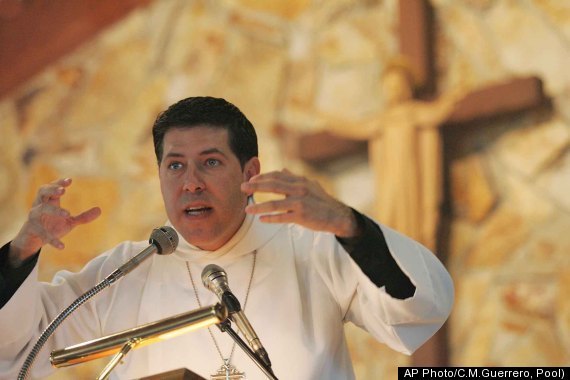
A new controversy has arisen in the Anglican Church in North America concerning the Episcopate and the recognition of Holy Orders usually classified as deriving from
episcopi vagantes, or 'wandering bishops.' Recently, the ACNA received into its House of Bishops without the benefit of consecration
sub conditione a bishop originally ordained in the 'Communion of Evangelical Episcopal Churches,' affectionately known in some circles as the CEEEEEC...
The problem lies in the fact that, historically, the Anglican Communion has simply refused to recognise Holy Orders conferred by those persons or entities which trace their origin to the various wandering bishops of the twentieth century, without issuing a final judgement as to the sacramental validity of the orders in question: this cautious and prudent disciplinary position was established by the Lambeth Conferences of 1920 and 1958.
By receiving a bishop whose orders originate from
episcopi vagantes without conditional consecration, the ACNA has broken from the long-standing discipline of the Anglican Communion in this matter. Anglicanism from the days of her orthodoxy has been very clear on this subject.
The Church Catholic has always taken the safest course as to the validity of Holy Orders, since the validity of orders is necessary for the validity of the Holy Eucharist and other sacraments, and has, whenever there has been a question or doubt about a particular ordination, supplied what might be lacking with
conditional ordination - the reiteration of orders under condition does not deny the possible validity of the orders concerned, but only seeks to remedy any defect present and to ensure that the ordination is beyond doubt - '
ecclesia supplet' - the Church supplies what is otherwise lacking in such an ordination by conditional administration of the same.
The Church has a most solemn moral and theological responsibility to make certain, as far as is possible, that the sacramental integrity of her life is preserved and transmitted unimpaired for sake of the salvation of souls. The valid continuation of the Sacraments of the Holy Eucharist, Penance, Unction of the Sick and Ordination itself depends on an unbroken and sacramentally assured conferral of a valid priesthood. Hence the Church has always followed the rule, 'better safe than uncertain,'in the administration of the sacraments.
The irony of this particular situation is that orders conferred by
episcopi vagantes are generally recognised by Roman Catholic canon law as 'valid but illicit,' possessive of the power of Order but conveyed in a canonically illegal manner. Anglican Orders, on the other hand, are dubbed null and void by the Roman Church, per
Apostolicae Curae (1896). Therefore, the historic Anglican position has, in such cases, been stricter in application than that of the Roman Communion. The Anglican Communion, again, has not asserted that
vagans orders are invalid, only that they are not to be recognised or permitted within her own ecclesial life. Oddly enough, with an ironic twist of providence, the APA and some other Continuing Churches possess Old Catholic orders from irregular sources, orders which should be recognised by the Roman See, whereas the Anglican succession is declared invalid at Rome. But for Anglicans, it is preeminently the regular, canonical and orderly administration of Holy Orders through and within duly-constituted catholic jurisdiction - Apostolic Succession of Order united to Apostolic Succession of Creed, Faith, Teaching and Government - which is rightly determined most important. Tactile succession can never be divorced from catholic orthodoxy and authentic ecclesiastical structure. And such canonical transmission and orderliness is mostly absent in the
vagantes phenomenon.
The orders of the Anglican Province of America were originally obtained from these same controversial sources: Bishop AH Mathew, Bishop CH Carfora, and Bishop FL Pyman of the English Old Catholic succession; Bishop HG de Willmott Newman and Bishop KC Pillai of the English Old Catholic succession; and Bishop C Duarte-Costa and Bishop EM Corradi-Scarella of the Brazilian Catholic Apostolic Church - orders theoretically recognised by Rome but not recognised by the Anglican Communion, orders which, when held up to every standard of Augustinian Western Catholic theology, are to be regarded as sacramentally valid, but uncanonical. In order to remove all scruple and doubt from the Anglican perspective, our hierarchy received conditional diaconal and priestly ordination, and consecration to the Episcopate, in October 1991 by three orthodox bishops of the Anglican Communion at the Deerfield Beach Unity Conference. This action did not deny the validity of the previous ordinations, but only sought to supply what was necessary according to Anglican theological and canonical precedent.
From an Anglican viewpoint, the ACNA should indeed be willing to do the same for its own clergy and people, in accordance with the perennial Anglican disciplinary approach and for the certitude of the sacramental life.
To read about this controversy, please go
here,
here and
here.
Posted by The Reverend Canon Chandler Holder Jones
(Copied from PhilOrthodox)







First Posted: 01/ 4/11 07:35 PM Updated: 01/ 4/11 07:35 PM